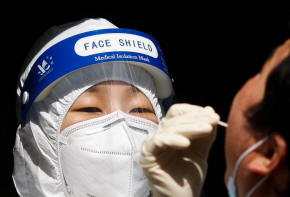Beijing to test 20 million for COVID in bid to avert Shanghai lockdown
misery
 Send a link to a friend
Send a link to a friend
 [April 26, 2022]
By Eduardo Baptista and Brenda Goh [April 26, 2022]
By Eduardo Baptista and Brenda Goh
BEIJING/SHANGHAI (Reuters) - Three-quarters
of Beijing's 22 million people lined up for COVID-19 tests on Tuesday as
authorities in the Chinese capital raced to stamp out a nascent outbreak
and avert the debilitating city-wide lockdown that has shrouded Shanghai
for a month.
Having seen the struggles of China's commercial hub to meet the basic
needs of its increasingly frustrated 25 million residents, people in
Beijing were stocking up on food and supplies.
Videos on social media showed people leaning out of Shanghai windows to
beat pots and pans in anger, or play "Do you hear the people sing?", a
protest anthem from the musical "Les Miserables", on flutes and
trumpets.
Beijing hoped to avoid such drama by acting swiftly.
It began tests in its most populous district Chaoyang on Monday morning.
By nighttime, authorities listed 10 other districts and one economic
development zone for mandatory tests this week, covering a total of 20
million people of which 16 million were scheduled to be screened on
Tuesday.
The orders come days after dozens of infections were found. Shanghai
waited for about a month and more than 1,000 cases before launching
city-wide testing in early April.

Liu Wentao, a Beijing cook, said he was concerned about the new
outbreak, but was confident the capital could handle it.
"The virus controls are stronger than in other places, I don't think it
will be like Shanghai," he said on his way to get tested.
Beijing recorded 33 new COVID cases for April 25, up from 19 the day
before with no deaths reported so far in the outbreak. The total case
load is miniscule compared with hundreds of thousands in Shanghai.
Shanghai reported 52 new COVID deaths on Tuesday, up from 51 the day
before. That takes the official death toll to 190, all reported from
April 17 onwards, although many residents have said relatives or friends
died after catching COVID as early as March, casting doubt over the
statistics.
ECONOMIC DAMAGE
In the capital, schools, stores and offices remained open, but the
iconic Lama temple would be closed to tourists from Wednesday, while
Beijing's National Theater would close for the rest of the month.
Officials have urged residents to refrain from leaving the capital and
avoid gatherings for the upcoming April 30-May 4 Labour Day holidays.
Concerns about the economy echoed among residents, businesses and
financial markets, with Chinese stocks, lingering near two-year lows.
"If we can't go to work, there will be no income," said Dewei, 31, who
worked at a small Chaoyang gym.

[to top of second column]
|

A medical worker wearing personal protective equipment (PPE)
administers a nucleic acid test at a mobile testing site outside a
hospital following the coronavirus disease (COVID-19) outbreak in
Beijing, China, April 26, 2022. REUTERS/Carlos Garcia Rawlins

The economic fallout from any lockdown in Beijing is likely to be
less severe than that on manufacturing powerhouse Shanghai, a key
cog in national and global supply chains.
"In Beijing, I think it has less impact on businesses because most
of these positions can be done from home," Beijing-based Joerg
Wuttke, president of the European Union Chamber of Commerce, told
Reuters.
"There is less trucking involved, there is less packaging involved,
there is less production going on."
Hwabao Trust economist Nie Wen estimated a twin Beijing-Shanghai
lockdown may trim one percentage point of China's economic output in
the second quarter.
That would add to geopolitical and property market headwinds during
a key year for President Xi Jinping, widely expected to seek a third
leadership term.
"The political implications of sealing off the capital of China
would be profound," said Yanzhong Huang, senior fellow with the
Council on Foreign Relations, a U.S. think tank, referring to
international reputation and social stability risks.
BAD WEATHER
In Shanghai, strict enforcement of measures continued, but plans for
a city-wide PCR testing exercise were somewhat derailed by initial
forecasts of hail and thunderstorm, later downgraded to cloudy
conditions.
While authorities say they have relaxed some curbs, most people are
still either confined to their homes or cannot leave their
residential compounds. Even those who can go out have few options,
with shops and most other venues closed.

In areas where leaving home is allowed, residents were asked to take
rapid antigen tests on their own, rather than line up for PCR
testing in the rain. In the rest of Shanghai, daily PCR tests
remained mandatory.
The prolonged lockdown has fuelled frustration over lost wages,
family separation and quarantine conditions, as well as access to
medical care and food, with residents struggling to dispose of trash
and make basic errands.
The Shanghai government did not immediately comment on signs of
growing discontent.
Asymptomatic and symptomatic new cases dropped slightly to 15,319
and 1,661, respectively, while cases outside quarantined areas were
flat at 217. Other cities that have been under lockdown began easing
restrictions once such cases hit zero.
(Reporting by Eduardo Baptista, Ryan Woo, Brenda Goh, Martin Quin
Pollard, Ellen Zhang and the Beijing and Shanghai bureaus; Writing
by Marius Zaharia; Editing by Kenneth Maxwell)
[© 2022 Thomson Reuters. All rights
reserved.] This material may not be published,
broadcast, rewritten or redistributed.
Thompson Reuters is solely responsible for this content. |